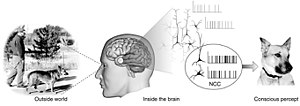
Back ربط عصبي للوعي Arabic Correlats neuronals de la consciència Catalan Neuronales Korrelat des Bewusstseins German Teadvuse neuraalsed korrelaadid Estonian 意識に相関した脳活動 Japanese Neurale correlaten van bewustzijn Dutch Correlato neural da consciência Portuguese Нейронные корреляты сознания Russian ประสาทสัมพันธ์แห่งการรับรู้อารมณ์ Thai 意識相關神經區 Chinese

The neural correlates of consciousness (NCC) are the minimal set of neuronal events and mechanisms sufficient for the occurrence of the mental states to which they are related.[2] Neuroscientists use empirical approaches to discover neural correlates of subjective phenomena; that is, neural changes which necessarily and regularly correlate with a specific experience.[3][4] The set should be minimal because, under the materialist assumption that the brain is sufficient to give rise to any given conscious experience, the question is which of its components are necessary to produce it.
- ^ Koch 2004, Figure 1.1 The Neuronal Correlates of Consciousness p. 16.
- ^ Koch 2004, p. 304.
- ^ See here Archived 2013-03-13 at the Wayback Machine for a glossary of related terms.
- ^ Chalmers, David J. (June 1998), "What is a neural correlate of consciousness?", in Metzinger, Thomas (ed.), Neural Correlates of Consciousness:Empirical and Conceptual Questions, MIT Press (published September 2000), ISBN 978-0-262-13370-8
© MMXXIII Rich X Search. We shall prevail. All rights reserved. Rich X Search